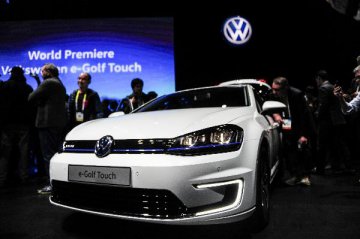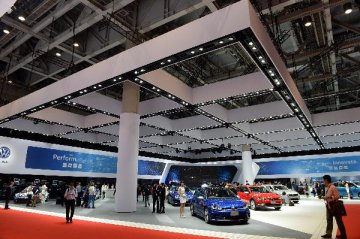Volkswagen will offer motorists a scrappage premium of up to 8,000 euros if they swap their older diesel vehicles against new ones, the German carmaker announced on Thursday.
The discounts apply to owners of diesel vehicles manufactured by the Volkswagen Group which belong to the motor classifications Euro1 until Euro4. The exact height of the premium detracted from the sales price of the new vehicle will be calculated on the basis of the size and type of vehicle with further details being revealed by the individual brands of the Wolfsburg-based corporation shortly.
Between August 2017 and June 2018, Volkswagen already introduced a similar time-limited scheme as a response to the ongoing "dieselgate" scandal. More than 210,000 older Volkswagen vehicles were removed from traffic internationally following revelations that the carmaker had installed illicit software to understate the actual Nitrogen Oxide (NOx) emissions produced in the operation of its diesel motors.
Volkswagen further announced on Thursday that motorists in 14 areas of Germany with particularly high NOx pollution would be offered an additional "swap premium" when they upgraded from Euro4 and Euro5 diesel motor categories to the latest, and purportedly cleaner, Euro6 standard. Christian Dahlheim, Volkswagen Group Head of Sales, told press that his company would make a "significant contribution" to improve air quality.
The newest financial incentives offered by Volkswagen are intended to avert the looming imposition diesel driving bans in Germany. Courts have already ordered municipal governments in Berlin, Stuttgart, Frankfurt and Hamburg to fully or partially banish older diesel cars from their streets as a means to lower nitrogen oxide (NOx) emission levels. Dozens of German cities currently do not comply with binding European Union (EU) clean air legislation due to their excessive NOx levels, a circumstance which has prompted the European Commission to file a lawsuit against Germany's federal government at the European Court of Justice (CJEU).
At a specially-convened government summit, Chancellor Angela Merkel's (CDU) ruling "grand coalition" unveiled a raft of new measures to address issues of urban air quality without requiring outright driving bans in the most affected cities. These include fleet renewal incentives, such as the ones offered by Volkswagen, alongside so-called "hardware upgrades" of affected vehicles to reduce their NOx emissions levels.
Hardware upgrades have been described as essential to achieve a significant reduction in NOx emissions without requiring driving bans by minister for the environment Svenja Schulze (SPD) and several national environmental groups but were previously resisted by transport minister Andreas Scheuer (CSU) and carmakers.
Whereas, the Volkswagen and Daimler Groups have by now surrendered their opposition to hardware upgrades on the premise that a certified procedure for them, BMW, Opel and several foreign manufacturers are still refusing to back the government on anything other than swap premiums and less-costly motor software updates.
Additionally, Volkswagen has made its support for the most contentious part of the policy package conditional on the ability of the "grand coalition" to ensure the participation of all carmakers in the retrofitting programs.
Speaking to the German press agency on Thursday, the automotive industry expert Ferdinand Dudenhoeffer described the Volkswagen fleet-renewal premiums as a "stimulus program" which came at a time when the carmaker was seeking to offset falling sales.
The director of the CAR center at the University of Duisburg-Essen insisted, however, that the introduction of nation-wide hardware upgrades remained the most ecologically-sensible solution to lower NOx emissions levels.





















Latest comments